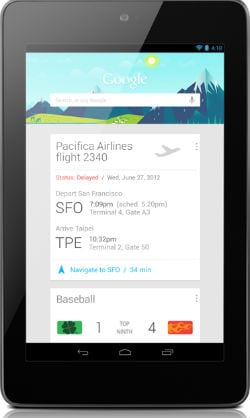 Field service technicians — and Average Joes, too — are continuing to warm up to tablet computers, in many cases ditching their old laptops in favor of the mobile-friendly device. And while Apple’s iPad has generally dominated the young tablet market, a few important developments over the past few months seem to be changing the complexion of the tablet marketplace — all the while encouraging more and more people to give the tablet a try.
Field service technicians — and Average Joes, too — are continuing to warm up to tablet computers, in many cases ditching their old laptops in favor of the mobile-friendly device. And while Apple’s iPad has generally dominated the young tablet market, a few important developments over the past few months seem to be changing the complexion of the tablet marketplace — all the while encouraging more and more people to give the tablet a try.
Google, the search giant, is now trying its hand at the tablet game. And so far, it’s been a success: its Nexus 7 tablet is going like gangbusters, selling out in several retail stores around the country.
The Nexus’ early success is important because it represents the latest in an emerging crop of credible competitors to the iPad. The Kindle Fire, released late last year, and the forthcoming Microsoft Surface, along with Google’s Nexus, make up a trio of viable alternatives to the iPad, which may still be the sleekest of the bunch, but sells for $499 — more than double what some other makers are charging.
Google’s Nexus 7 tablet, which was built specifically for Google by ASUS and runs on Android’s 4.1 Jelly Bean operating system, made its way onto store shelves and websites last week. Since its release, many U.S. retailers like Gamestop, Staples, and Office Depot have reported that the device had already sold out.
The Nexus, like Kindle’s Fire (and unlike the iPad) sports a 7-inch screen. The iPad’s is 9.7 inches. The smaller size appears to be hitting a sweet spot, too — Apple is widely rumored to be developing a smaller version of the iPad, too, called the Mini.
So far, the Nexus is getting rave reviews from around the Web. eWeek‘s Chris Preimesberger and even TechCrunch’s Apple fanboy MG Siegler both praised the Nexus 7 for its $199 (for 8GB) price point and small frame — which may prove ideal for workers constantly on the go. The Nexus is, however, a Wi-Fi-only device right now, which may discourage some field techs who work in signal-free areas and require 3G or 4G connectivity.
The main point, however, is that field service organizations interested in outfitting techs with tablets suddenly have a few options to choose from — and, surely, more to come. If anything, the Nexus 7 and its ilk should inspire more competition in what has, until now, been a pretty one-sided market.
More: What an iPad ‘Mini’ Could Mean for Field Service.
Click here to download a free whitepaper, “Five Steps to Make Field Service Profitable.”

Share this: